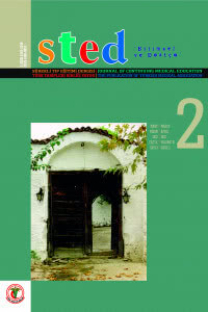Çocuklar ve ergenler aydınlatılmış onam sürecinin neresinde?
Informed consent process: where do the children and the adolescents stand?
___
- 1. Oğuz YN, Tepe H, Büken NÖ, Kucur DK. Biyoetik Terimleri Sözlüğü.1.Baskı.Ankara: Türkiye Felsefe Kurumu; 2005.p.1-322.
- 2. Kaushik JS, Narang M, Agarwal N. Informed consent in pediatric practice. Indian Pediatrics 2010;47(17):1039-46.
- 3. Canadian Paediatric Society Bioethics Committee. Treatment decisions regarding infants, children and adolescents. Paediatr Child Health 2004;9(2):99-103.
- 4. Hui E. Adolescent and parental perceptions of medical decision making in Hong Kong. Bioethics 2010;25(9):516-26.
- 5. Kuther TL. Medical decision-making and minors: Issues of consent and assent. Adolescence 2003;38(150):343-58.
- 6. Committee on Bioethics. İnformed consent, parental permission and assent in pediatric practice. Pediatrics 1995;95(2):314-7.
- 7. Spinetta JJ, Masera G, Jankovic M, Oppenheim D, Martins AG, Ben Arush, et al. Valid informed consent and participative decision-making in children with cancer and their parents: A report of the SIOP Working Committee on psychosocial issues in pediatric oncology. Medical and Pediatric Oncology 2003;40(4):244-6.
- 8. Canadian Paediatric Society.Treatment decisions regarding infants, children and adolescents. Paediatrics and Child Health 2004;9(2):99-103.
- 9. Kelsey J, Abelson-Mitchell N, Skirton H. Perceptions of young people about decision making in the acute healthcare environment. Paediatric Nursing 2007;19(6):14-8.
- 10. Runeson I, Hallström I, Elander G, Hermerén G. Childrens participation in the decision-making process during hospitalization: An observational study. Nursing Ethics 2002;9(6):583-98.
- 11. Doig C, Burgess E. Witholding life-sustaining treatment: Are adolescents competent to make the decisions?. Canadian Medical Association Journal 2000;162(11):158588.
- 12. McCabe MA. Involving children and adolescents in medical decision making: Developmental and clinical considerations. Journal of Pediatric Psychology 1996;21(4):505-16.
- 13. Spencer GE. Children's competency to consent: An ethical dilemma. Journal of Child Health Care 2000;4(3):117-22.
- 14. Dickens BM, Cook RJ. Adolescents and consent to treatment. International Journal of Gynecology and Obstetrics 2005;89:179-84.
- 15. Michaud PA Berg-Kelly K, Macfarlane A, Benaroyo L. Ethics and adolescent care: An international perspective. Current Opinion in Pediatrics 2010;22(4):418-22.
- 16. Hokkanen H, Eriksson E, Ahonen O, Salantera S. Adolescents with cancer experience of life and how it could be made easier. Cancer Nursing 2004;27(4):325-35.
- 17. Zwaanswijk M, Tates K, van Dulmen S, Hoogerbrugge, PM, Kamps WA, Beishuizen A, et al. Communicating with child patients in pediatric oncology consultations: A vignette study on child patients', parents', and survivors' communication preferences. Psychooncology 2011;20(3):269-77.
- 18. Coleman DL, Rosoff P M. The Legal authority of mature minors to consent to general medical treatment. Pediatrics 2013;131:78693.
- 19. Çocuk Hakları Sözleşmesi (Resmi Gazete 09/12/1994, 4058).
- 20. Sağlık Bakanlığı Hasta Hakları Yönetmeliği (Resmi Gazete 01/08/1998, 23420).
- 21. Türk Tabipler Birliği. Türk Tabipler Birliği Etik Bildirgeleri. Ankara: 2010.
- 22. Biyoloji ve Tıbbın Uygulanması Bakımından İnsan Hakları ve İnsan Haysiyetinin Korunması Sözleşmesi: İnsan Hakları ve Biyotıp Sözleşmesi (Resmi Gazete 03/12/2003, 5013).
- 23. Aydın E. Aydınlatılmış onam. Tıp Etiği.1.Baskı.Ankara: Güneş Kitapevi;2006.p.19- 31.
- 24. Beachamp TL, Childress JF. Respect for autonomy. Principles of Biomedical Ethics. 5th ed. New York: Oxford University Press; 2001. p.57-112.
- 25. Appelbaum PS. Assessment of patients competence to consent to treatment. The New England Journal of Medicine 2007;357:1834-40.
- 26. Çuhadaroğlu F. Ergenlik döneminde psikolojik gelişim özellikleri. Katkı Pediatri Dergisi 2000;21(6):863-68.
- 27. Piaget J. Çocukta zihinsel Gelişim. Portakal H. (çeviren).2. Baskı.İstanbul: Cem Yayınevi; 2004.
- 28. Bibace R, Walsh M.E. Development of children's concepts of illness. Pediatrics 1980;66(6):912-7.
- 29. Weithorn LA, Campbell S B. The competency of children and adolescents to make informed treatment decisions. Child Development 1982;53(6):1589-98.
- 30. Hickey K. Minors rights in medical decision making. JONAS Healthcare Law, Ethics, and Regulation 2007;9(3):100-04.
- 31. Partridge BC. Adolescent psychological development, parenting styles, and pediatric decision making. Journal of Medicine and Philosophy 2010;35:51825.
- 32. Shaw M. Competence and consent to treatment in children and adolescents. Advances in Psychiatric Treatment 2001;7:150-59.
- 33. Roberts LW. Informed consent and the capacity for voluntarism. The American Journal of Psychiatry 2002;159:70512.
- 34. Mack JW, Grier H E. The day one talk. Journal of Clinical Oncology 2004;22(3):563-66.
- 35. De Lourdes Levy M, Larcher V, Kurz R. Informed consent/assent in children. Statement of the Ethics Working Group of the Confederation of European Specialists in Paediatrics (CESP). European Journal of Pediatrics 2003;162:62933.
- 36. Piersol LW, Johnson A, Wetsel A, Holtzer K, Walker C. Decreasing psychological distress during the diagnosis and treatment of pediatric leukemia. Journal of Pediatric Oncology Nursing 2008;25:323-30.
- 37. Scherer DG, Repucci ND. Adolescents' capacities to provide voluntary informed consent. Law and Human Behavior 1988;12(2):123-41.
- 38. Scherer DG. The capacities of minors to exercise voluntariness in medical treatment decisions. Law and Human Behavior 1991;15(4):431-49.
- 39. De Trill M, Kovalcik R. The child with cancer ınfluence of culture on truth-telling and patient care. Annals of the New York Academy of Sciences1997;20(809):197-210.
- 40. Joffe S, Truog RD, Shurin SB, Emanuel EJ. Ethical Consideration in Pediatric Oncology. In:Pizzo PA,Poplack DG ed. Principles and Practice of Pediatric Oncology. 5th ed., Philadelphia:Lippincott Williams&Wilkins; 2007. p. 1467-86.
- 41. Bartholome WG. A new understanding of consent in pediatric practice: consent, parental permission, and child assent. Pediatr Ann 1989;18:26265.
- ISSN: 1300-0853
- Yayın Aralığı: 6
- Başlangıç: 1992
- Yayıncı: -
Çocuklar ve ergenler aydınlatılmış onam sürecinin neresinde?
Hatice KÜRECİ DEMİR, Nuket BÜKEN ÖRNEK
Üniversite öğrencilerinin cinsel sağlık konusundaki bilgi düzeyleri ve davranışları
Ergül ASLAN, HATİCE ACAR BEKTAŞ, ŞÜKRAN BAŞGÖL, Sevda DEMİR, PINAR IRMAK VURAL
Üniversite öğrencilerinin toplumsal cinsiyet rolüne yönelik görüşleri
Rukuye AYLAZ, Gülsen GÜNEŞ, Özge UZUN, Süheyla ÜNAL
Hatay hemoglobinopati tanı, kontrol ve eğitim merkezi'nin çalışmalarının kesitsel değerlendirilmesi
İlaç kullanan gebeye yaklaşım: Teratojenite riski ve danışmanlık hizmeti
Gökben YASLI, EBRU TURHAN, MUSTAFA TÖZÜN, Azime AHİ, Sinem DOĞANAY, Yasemin ÜLKEN
Çocuklarda cinsel istismara bağlı posttravmatik stres bozukluğu (olgu analizi)
